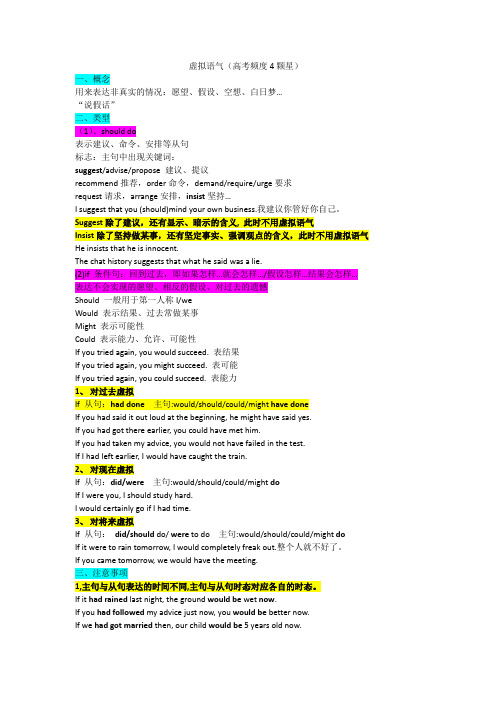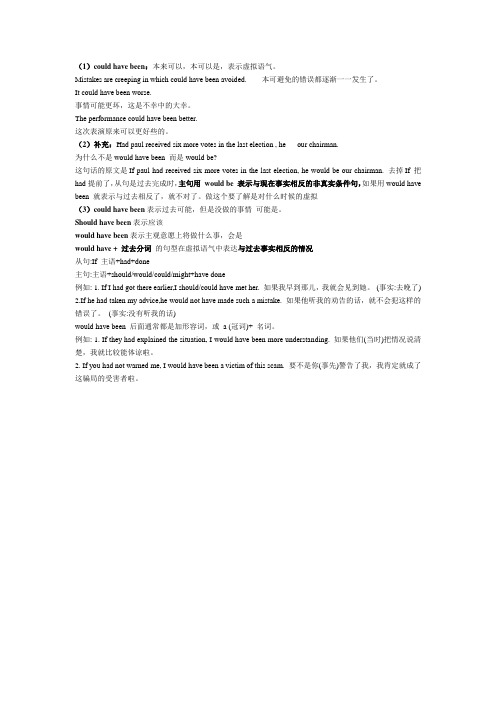虚拟语气4
- 格式:ppt
- 大小:915.00 KB
- 文档页数:40

(完整版)英语虚拟语气语法归纳总结英语中的虚拟语气是一种表示非事实或想象的语气,用来表达对现实情况的猜测、愿望、要求、建议、命令和反讽等。
虚拟语气主要通过动词的形式和句子的结构来表达。
一、虚拟语气的用法:1.表达建议、要求、命令、禁止:- 主语+动词原形+宾语(动词原形要用动词底形、如be);- 主语+动词原形+that从句(用于表达建议、命令、禁止,动词原形用“should + 动词原形”或用情态动词)。
例句:- It is important that he be present at the meeting.(建议)- I suggest that he should go to the doctor.(建议)- They insisted that he leave the room immediately.(命令)2.表达愿望、请求、要求:-主语+动词过去式;- 主语+would/could/might + 动词原形;- 主语+动词过去式+宾语+should + 动词原形。
例句:- I wish I could fly.(愿望)- I would appreciate it if you could help me.(请求)3.表示虚拟条件:- If条件从句中的谓语动词用过去完成时,主句用would/should/might/could + have + 过去分词;- If条件从句中的谓语动词用过去时,主句用would/should/could + 动词原形。
例句:- If I had known his phone number, I would have called him.(虚拟条件)- If you had listened to me, we could have finished the project earlier.(虚拟条件)4.表达建议、要求、祝愿:- If only内部称述 + 主语 + 过去式。

虚拟语气(高考频度4颗星)一、概念用来表达非真实的情况:愿望、假设、空想、白日梦…“说假话”二、类型(1)、should do表示建议、命令、安排等从句标志:主句中出现关键词:suggest/advise/propose 建议、提议recommend推荐,order命令,demand/require/urge要求request请求,arrange安排,insist坚持…I suggest that you (should)mind your own business.我建议你管好你自己。
Suggest除了建议,还有显示、暗示的含义, 此时不用虚拟语气Insist除了坚持做某事,还有坚定事实、强调观点的含义,此时不用虚拟语气He insists that he is innocent.The chat history suggests that what he said was a lie.(2)if 条件句:回到过去,即如果怎样…就会怎样…/假设怎样…结果会怎样…表达不会实现的愿望、相反的假设、对过去的遗憾Should 一般用于第一人称I/weWould 表示结果、过去常做某事Might 表示可能性Could 表示能力、允许、可能性If you tried again, you would succeed. 表结果If you tried again, you might succeed. 表可能If you tried again, you could succeed. 表能力1、对过去虚拟If 从句:had done主句:would/should/could/might have doneIf you had said it out loud at the beginning, he might have said yes.If you had got there earlier, you could have met him.If you had taken my advice, you would not have failed in the test.If I had left earlier, I would have caught the train.2、对现在虚拟If 从句:did/were主句:would/should/could/might doIf I were you, I should study hard.I would certainly go if I had time.3、对将来虚拟If 从句:did/should do/were to do 主句:would/should/could/might doIf it were to rain tomorrow, I would completely freak out.整个人就不好了。

考研英语中虚拟语气的4种用法
虚拟语气在状语从句中的运用除了可以表示条件外,还可以表示比拟、结果、目的等。
虚拟语气用于表示条件的状语从句中,一般称为虚拟条件句。
根据时间的不同,虚拟条件句中谓语动词时态的变化可能有三种形式,即现在、过去和将来。
当it作形式主语,后面用形容词作表语,即在it is + adj.这样的句型中,当描述主语的表语形容词是advisable,
critical,crucial,desirable,essential,imperative,important,等形容词时,主语从句的谓语动词多用虚拟语气,如果是现在时,谓语动词用should/would +动词原形(should/would经常省略);如果是过去时,那么用should/would + have done的形式。
表示“建议、请求、命令、要求”等主观意向的词(如:suggest、advise、assume、decide、demand、desire、insist、propose、order、remend、require、suggest??),引导宾语从句时需用虚拟语气。
虚拟语气中的格式很固定:谓语动词用should+动词原形,should可以略。
名词advice、assumption、decision、demand、desire、insistence、order、proposal、requirement、remendation、suggestion后面假设有同位语从句,从句的谓语动词也应使用虚拟语气的形式。

(1)could have been:本来可以,本可以是,表示虚拟语气。
Mistakes are creeping in which could have been avoided. 本可避免的错误都逐渐一一发生了。
It could have been worse.事情可能更坏,这是不幸中的大幸。
The performance could have been better.这次表演原来可以更好些的。
(2)补充:Had paul received six more votes in the last election , he __ our chairman.为什么不是would have been 而是would be?这句话的原文是If paul had received six more votes in the last election, he would be our chairman. 去掉If 把had提前了,从句是过去完成时,主句用would be 表示与现在事实相反的非真实条件句,如果用would have been 就表示与过去相反了,就不对了。
做这个要了解是对什么时候的虚拟(3)could have been表示过去可能,但是没做的事情可能是。
Should have been表示应该would have been表示主观意愿上将做什么事,会是would have + 过去分词的句型在虚拟语气中表达与过去事实相反的情况从句:If 主语+had+done主句:主语+should/would/could/might+have done例如: 1. If I had got there earlier,I should/could have met her. 如果我早到那儿,我就会见到她。
(事实:去晚了) 2.If he had taken my advice,he would not have made such a mistake. 如果他听我的劝告的话,就不会犯这样的错误了。

虚拟语气考点1. If从句中的虚拟语气省略if,从句的语序用到装,即将were, had或should移至主语的前面,但否定词not 不前移。
1、与过去事实相反:从句sb had done,主句sb would(should,could,might)+ have done;1. Had Judy been more careful on the maths exam, she ____ much better results now.2008A. would be gettingB. could have gotC. must getD. would get2.___, he would not have recovered so quickly.2005/1995A. Hadn't he been taken good care ofB. Had he not been taken good care ofC. Had not he been taken good care ofD. Had he been not taken good care of3. I ___the party much more if there hadn’t been quite such a crowd of people there.2004/1996A. would enjoyB. will have enjoyedC. would have enjoyedD. will be enjoying4. All of us would have enjoyed the party much more if there ___ quite such a crowd of people there.2004/2000A. weren’tB. hasn’t beenC. hadn’t beenD. wouldn’t5. ___for the fact that she broke her leg, she might have passed the exam.2002A. Had it not beenB. Hadn’t it be enC. Was it notD. Were it not6. _____enough time and money, the researchers would have been able to discover more in this field.1998a. Givingb. To givec. Givend. Being given7. _____ time, he’ll make a first-class tennis player. 1996A. HavingB. GivenC. GivingD. Had8We could ___him with a detached house when he came, but he had specifically asked for a small flat.1995A. provideB. have providedC. not provideD. not have provided9. ______you were busy, I wouldn’t have bothered you with my questions. 1994A. If I realizedB. Had I realizedC. I realized thatD. As I realized10. _____ their help, we would not have succeeded.1992A. Hadn't been forB. Had it not been forC. It hadn't been forD. Had not it been for11. If you _____ in such a hurry you sugar into the sauce instead of salt.1992A. were not, would not putB. were, would putC. had been, would have putD. had not been, would not have put12. "Did you hear of his death?'"Yes. If he ___ in time, he ___.”1990A. had been operated on, might not dieB. had been operated on, might not have diedC. were operated on, might not dieD. were operated on,- might not have died2、与现在事实相反:从句sb did(were),主句sb would(should, could, might)+do;1. If there were no subjunctive mood, English _____ much easier to learn.2009A. could have beenB. would beC. will beD. would have been2. “You ______ borrow my notes provided you take care of them,” I told my friend. 2007A. couldB. shouldC. mustD. can3. If you explained the situation to your solicitor, he ________ able to advise you much better thanI can.2005A. would beB. will have beenC. wasD. Were4. If I knew Japanese , I ______ for the position.1991A. would applyB. will applyC. may have appliedD. will have applied3、与将来事实相反:从句sb did (should+do或were+to do),主句sb would (should, could, might)+do。

九年级英语Unit41. if引导的非真实性条件状语从句即虚拟语气通过动词形式的变化来表示说话人对发生的动作或存在的状态所持的态度或看法的动词形式称为语气,虚拟语气表示说话人所说的话不是事实,而是一种祝愿,建议或是与事实相反的假设等。
If引导的条件状语从句分为真实和非真实条件句,非真实条件句应用虚拟语气。
如果要表示与现在或将来事实相反时,其虚拟语气结构为:句型条件从句主句谓语动词形式动词过去式(be动词用were)would+动词原形即:(从句)if +主语+动词过去式(b e动词用were), 一般过去时(主句)主语+would+动词原形过去将来时如:If I had time, I would go for a walk.如果我有时间,我就会去散步。
(事实上我现在没有时间)If I were you, I would take an umbrella.假如我是你的话,我会带上雨伞。
(事实上我不是你)I would say no if someone asked me to be in a movie. 假如有人请我当电影演员,我会表示拒绝。
(事实上瑞没有人请我当电影演员)2. pretend to do sth.假装做某事I pretended to sleep just now.pretend +从句假装… I pretended that I fell asleep.3. be late for 迟到如:I am late for work/ school/ class/ party.4. a few与 a little的区别,few与little的区别⑴a few一些修饰可数名词a little一些修饰不可数名词两者表肯定意义如:He has a few friends. 他有一些朋友。
There is a little sugar in the bottle. 在瓶子里有一些糖。
⑵few 少数的修饰可数名词little少数的修饰不可数名词但两者表否定意义如:He has few friends. 他没有几个朋友。
虚拟语气句型 4 (错综时间虚拟条件句)有时条件从句和主句所表示的动作在时间上可以不一致(例如一个与过去事实相反,另一个与现在事实相反),这种虚拟条件句就称为错综时间虚拟条件句。
在这种条件句中,动词的形式要根据具体情况进行调整。
1. 如果昨晚下过雨,今天就会很冷。
2. 我原先要是听了你的建议,现在工作就不会有麻烦了。
3.如果我是你,昨晚就会去看电影。
4. 如果你身体好一些,我们就会让你参加他们的工作。
5. 如果他跟我讲过此事,我现在就会知道做什么。
例句:She would never have behaved like that if she had some common sense.如果她有一些常识的话,她就决不会像那样做了。
If he had listened to me, he would not be in such trouble now.如果他听了我的话,他现在就不会有这样的麻烦。
If I had a bike (now), I would have lent it to you yesterday.假如我有自行车,昨天早就借给你了。
If you had not studied the problem carefully, you would find difficulty now.如果当初你没有认真研究这个问题,现在你就会遇到困难。
If you had followed the doctor's advice(then), you would be all right now.如果你那时听了医生的劝告,你现在就好了。
If you hadn’t finished the homework by now, you would not be allowed to see the film this evening.假如你现在还没有完成作业,就不会允许你今晚去看电影。
句型说明:错综时间条件句中,特别注意时间状语,在这种情况下必须明确给以时间或通过上下文可明白看出时间不同,否则就按前面表格中一般时间搭配使用。
虚拟语气总结1一种定语从句:It’s time that+did2两种目的状语从句:so that/in order that+ can/may/could/might +doin case\lest\for fear以防that+should do3三种随时变化句:①wish 现在→did/wereif only +过去→had doneas if/though 将来→could/would do②would rather+现在/将来→did/were过去→had done③现在:if+did/were, would+ do过去:if+had done, would+ have done将来:didif+ were to do, would+ doshould do注意:除了由if引导的虚拟条件句外,还有倒装条件句,即把were、had或should提前;混合时间句,虚实错综句,以及含蓄条件句,即由or, otherwise, with, without, but for来引导的;4四种名词性从句:①当表语是important, natural, necessary, possible, strange, arranged, decided, demanded, ordered, requested, suggested, surprising, a pity, no woder时,主语从句要用虚拟语气;例:It’s important that we should help each other.②动词一坚持insist,两命令command, order,三建议advise, propose, suggest,四要求ask, demand, request, require后的宾语从句要用虚拟语气;例:He insisted that he should be sent to the West.注:insist坚持说, suggest暗示,表明时,从句应用陈述语气;如:Her pale face suggested that she was ill.1. Mother insisted that John should go to bed before 9 o’olock.对比:He insisted that I had taken away his dictionary.不是建议、要求、命令或主张2. His suggestion that Tony should be invited to the party was refused.同位语从句对比:His words suggested that he was very angry with me.不是建议、要求、命令③idea, plan以及表示“坚持,命令,建议,要求”等动词的同源名词作主语时,表语从句用虚拟语气;例:My suggestion is that we should hold a class meeting.④idea, plan以及表示“坚持,命令,建议,要求”等动词的同源名词后的同位语从句要用虚拟语气;例:The office gave an order that his soldiers fight back bravely.If +were/ did 动词过去式,主语+情态动词would, could, might, should+do用来表示对现在情况的假设1. I don’t have a cellphone. If I had one , it would be convenient for me to contract others.If +had done 过去完成式,主语+情态动词would, could, might, should+havedone用来表示对过去情况的假设1. If I had gone to the concert, I would have seen the famous singer.If +were/ did 动词过去式, 主语+情态动词would, could, might, should+ dowere to doshould do 用来表示对将来情况的假设1. If I were not to take/ should take/ took the exam tomorrow, I would go shopping with you.虚拟语气条件句的倒装:在虚拟语气条件句中,如果出现助动词were, should, had,可省略if, 把这些词提到主语前面,变成倒装句;1. Should he act like that again, he would be fined. If he should act like that again, he would be fined;Were he to act like that again, he would be fined. If he were to act like that again, he would be fined.If he acted like that again, he would be fined.不可以倒装2. Had the doctor come in time last night, the boy would have been saved.If the doctor had come in time last night, the boy would have been saved.3. If I had time now, I would go to the film with you. 不可以倒装,因为句中的had不是助动词But for….--> If it were not for…../ If it hadn’t been for1. But for the determined captain, all the passengers on board wouldn’t have been saved.If it hadn’t been for the determined captain, all the passengers on board……2. But for your rich parents, you wouldn’t live such a easy life.If it were not for your rich parents, you wouldn’t live such a easy life.。
四虚拟语气虚拟语气出现在状语从句,宾语从句,主语从句,表语从句,同位语从句和特殊句型中。
现将虚拟语气按上列句型进行归纳。
1状语从句分为条件状语从句,方式状语从句和目的状语从句(1)由if引导的条件状语从句其动词形式如下:A。
与现在事实相反,If the cat could fly, it would cat the bird now.If I were in your place now, I would not accept the job.If there were no water, there would be no life.If I knew his telephone number I would call him up now.If I were rich now, I would buy a car.B. 与将来事实相反If it should snow tomorrow I would not come.If I were to go abroad I would go to America but I know that is absolutely impossible.He won’t come. If he came I would show him my new picture.C.与过去事实相反If I had left earlier yesterday I would have caught the plane.If we had tried again we would have succeeded at that time.If it had not been for the soldier, the boy would have been drowned.D,混合条件状语从句If she had n’t trained hard in the past, she wouldn’t be able to run so fast now.If the man had died in the accident last week, he wouldn’t be here in front of you now.Ann would be alive today if the doctor had come sooner last night.If you had listened carefully in class, you would find it easier to do the exercises now.注意:如果条件状语从句含有had, should, were把had, should, were提到句首并省掉if.如:Should it be fine tomorrow, I would go.Had he studied hard, he couldn’t have failed in the exam.Were I you I would get up early in the morning.(2)由as if, as though引导的方式状语从句,其谓语形式:与过去事实相反,用过去完成时与现在事实相反,用过去时He walks as if he were drunk.Tom talks as though he knew everything.Bill speaks as if he had been there before.(3)目的状语从句so that, in order引导的目的状语从句中,肯定时必须用情态动词,can ,may否定时用should.;for fear that , lest 引导的从句用should.I got up very early so that I could catch the first train.He went over the papers very carefully lest he should leave any mistakes in them.I walked out of the room quietly so that I should not wake up the children.In order that his son can go to a key university he keeps his son working hard at his lessons .2.宾语从句(1)wish 引导的宾语从句的谓语动词形式为:与过去事实相反用过去完成形式与现在事实相反用过去形式与将来事实相反用过去将来形式I wish I were as strong as you.I wish I had come to the meeting yesterday.I wish he would go with you tomorrow.(2 ) would rather,= would just as soon,= would sooner 引导的宾语从句的谓语动词形式为:如果表示与过去相反,动词用过去完成式,如果表示与现在事实相反或将来事实相反动词形式都用过去式,如:I would rather you came tomorrow。